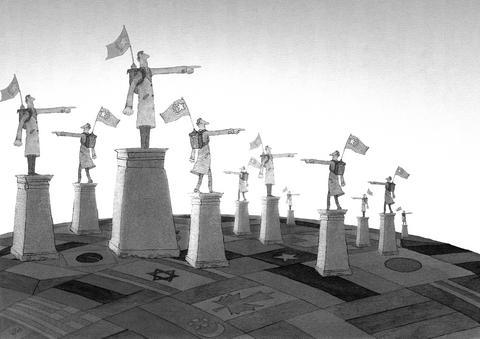When China won the right to stage the 2008 Olympics, the outburst of joy around the nation was overwhelming.
This was to be a major sign of global recognition for the way in which China has emerged from its Mao-era shell and become a world player over the last 30 years. Now things are looking rather less rosy, with implications that go beyond the sports events of August.
The announcement by Steven Spielberg, that his conscience about the "unspeakable crimes against humanity that continue to be committed in Darfur" would not allow him to go through with directing Beijing's opening ceremony, brings home the collateral damage that China risks from its association with such regimes.

Mia Farrow's warning that Spielberg risked becoming a modern Leni Riefenstahl if he did for Beijing what she did for the 1936 Berlin Olympics seemed overblown. But the director's decision shows China cannot expect people to slot its behavior into neat little boxes, as it does -- one for trade, one for Confucian culture, one for the propagation of reassurances that China's rise is a peaceful one, one for ensuring the flow of raw material to its industry, and one for the defense of national sovereignty.
China has played such a bad hand in Sudan one can only conclude that it is tone deaf when it comes to international politics. Sudan is a useful supplier of energy, but China has other sources. Its own policies in Sinicizing the vast western territory of Xinjiang may be cloaked from the world, but Darfur is out in the open, and its foot-dragging cannot escape criticism -- sharpened by the latest actions of Khartoum.
Some will dismiss Spielberg's decision as grandstanding by a member of the California elite. Others will wonder why he undertook the job in the first place. But even Chinese critics of the regime hold back from advocating a boycott. Engagement remains, for many of them, still the best way to get Beijing to adopt a more liberal path.
But despite recent signs of a more liberal stance, the system remains oppressive toward anything regarded as an organized threat. The plight of Chinese internal critics has largely been abandoned by the West. Trade and investment opportunities have trumped concern for dissidents.
After Spielberg, the focus will be on Sudan, and the question will be how many others will follow him. Nine Nobel Peace Prize laureates have written to the Communist Party leader, Hu Jintao (胡錦濤) , urging him to uphold Olympic ideals by pressing Sudan to stop the atrocities.
On past form, Beijing is not inclined to bow to foreign pressure. Why should it, one may ask, since it has done so well over the last 30 years and the outside world is still beating a path to its door?
With the Olympics neatly slotted into development plans for the Beijing region and foreign governments taking care not to say anything out of place on the human rights front, decisions such as Spielberg's or the letter from the Nobel laureates will be filed away.
Its stance could lead to a toughening of positions outside China, be it from US politicians veering towards protectionism or from corporate sponsors worried about being associated with China while human rights lobbyists step up the pressure in the West.
Beijing has to learn that engagement is a two-way street -- and that the neat boxes of its policy approach cannot always be separated as it would wish.
Father’s Day, as celebrated around the world, has its roots in the early 20th century US. In 1910, the state of Washington marked the world’s first official Father’s Day. Later, in 1972, then-US president Richard Nixon signed a proclamation establishing the third Sunday of June as a national holiday honoring fathers. Many countries have since followed suit, adopting the same date. In Taiwan, the celebration takes a different form — both in timing and meaning. Taiwan’s Father’s Day falls on Aug. 8, a date chosen not for historical events, but for the beauty of language. In Mandarin, “eight eight” is pronounced
In a recent essay, “How Taiwan Lost Trump,” a former adviser to US President Donald Trump, Christian Whiton, accuses Taiwan of diplomatic incompetence — claiming Taipei failed to reach out to Trump, botched trade negotiations and mishandled its defense posture. Whiton’s narrative overlooks a fundamental truth: Taiwan was never in a position to “win” Trump’s favor in the first place. The playing field was asymmetrical from the outset, dominated by a transactional US president on one side and the looming threat of Chinese coercion on the other. From the outset of his second term, which began in January, Trump reaffirmed his
Despite calls to the contrary from their respective powerful neighbors, Taiwan and Somaliland continue to expand their relationship, endowing it with important new prospects. Fitting into this bigger picture is the historic Coast Guard Cooperation Agreement signed last month. The common goal is to move the already strong bilateral relationship toward operational cooperation, with significant and tangible mutual benefits to be observed. Essentially, the new agreement commits the parties to a course of conduct that is expressed in three fundamental activities: cooperation, intelligence sharing and technology transfer. This reflects the desire — shared by both nations — to achieve strategic results within
It is difficult not to agree with a few points stated by Christian Whiton in his article, “How Taiwan Lost Trump,” and yet the main idea is flawed. I am a Polish journalist who considers Taiwan her second home. I am conservative, and I might disagree with some social changes being promoted in Taiwan right now, especially the push for progressiveness backed by leftists from the West — we need to clean up our mess before blaming the Taiwanese. However, I would never think that those issues should dominate the West’s judgement of Taiwan’s geopolitical importance. The question is not whether